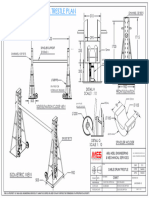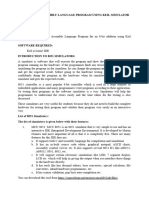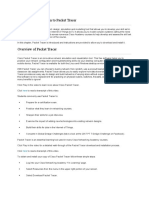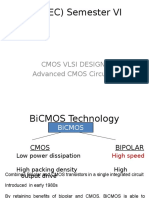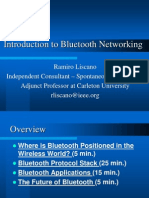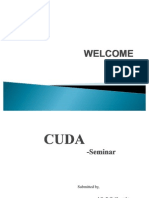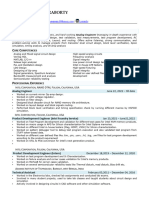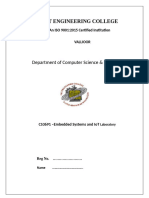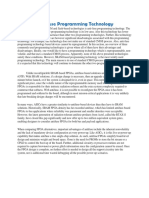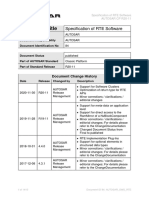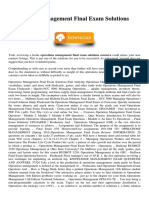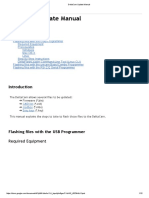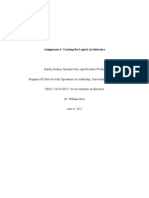C++ Programming For CAN Bus Communication (Beginner To Intermediate)
Uploaded by
robyandharaC++ Programming For CAN Bus Communication (Beginner To Intermediate)
Uploaded by
robyandharaSyllabus
C++ Programming for CAN Bus Communication (Beginner to
Intermediate)
Course Scheme & Date
Course Duration Learning Method Date
10 days course (30 hours total) Onsite To Be Informed
Prerequisites
✓ A grasp of fundamental programming concepts like variables, data types, operators, control flow
(if/else statements, loops), and functions will be highly beneficial. This foundation will help you
understand how C++ structures code and how different elements interact.
✓ Familiarity with basic C++ syntax, data types (integers, floats, characters, etc.), arrays, pointers,
and basic object-oriented concepts (classes and objects) would be advantageous. Understanding
these fundamentals will allow you to write and comprehend C++ code effectively in the context
of CANBUS development.
✓ Having a basic understanding of digital signals, binary data, and digital communication concepts
can be helpful. CANBUS operates on digital principles, so some background knowledge can
provide a better context for the communication protocols involved.
✓ Familiarity with electronic components like microcontrollers and CAN transceivers might be
beneficial.
Course Information
Description
This course is designed for participants with basic C++ knowledge who want to learn the
fundamentals of CANBUS programming using C++. Participants will gain the essential skills to
develop C++ programs for interacting with CANBUS networks and lay the foundation for further
exploration in embedded system communication.
Learning Objectives
• Participants Understand the CANBUS communication protocol and its applications.
• Set up a development environment for C++ CANBUS programming.
• Utilize C++ libraries for interacting with CANBUS interfaces.
• Write basic C++ programs to transmit and receive messages on a CANBUS network.
• Gain experience with troubleshooting common CANBUS communication issues.
BINUS CENTER Page 1 of 4
Course Materials
Introduction & CANBUS Fundamentals
Session 1: Introduction to CANBUS
• CANBUS overview - core concepts, benefits, and limitations.
• CANBUS network topology, message structure (identifier, data).
• Real-world applications of CANBUS in embedded systems.
Session 2: C++ Development Environment Setup
• Choosing a suitable C++ compiler and IDE (e.g., GCC, CLion).
• Including necessary CANBUS libraries (e.g., SocketCAN,ixxat).
• Setting up a development project for CANBUS communication.
Session 3: Introduction to CANBUS Libraries
• Exploring popular C++ CANBUS libraries and their functionalities.
• Understanding basic functions calls for initialization, message transmission, and reception.
• Hands-on practice: Setting up a development environment and exploring CANBUS library
functions.
Programming for CANBUS
Session 4: CANBUS Message Construction
• Constructing CAN messages in C++ using library functions.
• Specifying CAN identifiers, data length, and data payload.
• Hands-on practice: Building C++ programs to create CAN messages with different data types.
Session 5: Transmitting CAN Messages
• Implementing C++ code for transmitting CAN messages on the network.
• Handling potential errors during message transmission.
• Hands-on practice: Writing C++ programs to transmit CAN messages to a simulated or physical
CANBUS network.
Session 6: Receiving CAN Messages
• Understanding techniques for receiving CAN messages in C++.
• Processing received message data within C++ programs.
• Hands-on practice: Building C++ programs to receive CAN messages and handle the received
data.
Advanced Topics & Troubleshooting
Session 7: CANBUS Monitoring and Error Handling
• Utilizing C++ code to monitor CANBUS activity (bus status, error flags).
• Implementing error handling mechanisms for communication issues.
• Hands-on practice: Writing C++ programs to monitor CANBUS status and handle errors.
BINUS CENTER Page 2 of 4
Session 8: CANBUS Configuration and Filtering
• Introduction to CANBUS configuration tools and message filtering techniques.
• Configuring CAN nodes and filters using C++ libraries (if applicable).
Session 9: Debugging and Troubleshooting
• Common CANBUS communication problems and debugging strategies.
• Using debugging tools and logs to identify and fix CANBUS errors.
• Hands-on practice: Simulating and troubleshooting common CANBUS communication issues.
Final Project and Showcase
Session 10: Project Work and Wrap-Up
• Students work on a hands-on project to apply their knowledge of CAN bus communication in
C++.
• Review of key concepts and discussion of real-world applications of CAN bus technology
Course Schedule
Date Subject
Day-1 Session 1
[ Time to be Confirmed ] Introduction to CANBUS
Day-2 Session 2
[ Time to be Confirmed ] C++ Development Environment Setup
Day-3 Session 3
[ Time to be Confirmed ] Introduction to CANBUS Libraries
Day-4 Session 4
[ Time to be Confirmed ] CANBUS Message Construction
Day-5 Session 5
[ Time to be Confirmed ] Transmitting CAN Messages
Day-6 Session 6
[ Time to be Confirmed ] Receiving CAN Messages
Day-7 Session 7
[ Time to be Confirmed ] CANBUS Monitoring and Error Handling
Day-8 Session 8
[ Time to be Confirmed ] CANBUS Configuration and Filtering
Day-9 Session 9
[ Time to be Confirmed ] Debugging and Troubleshooting
Day-10 Session 10
BINUS CENTER Page 3 of 4
[ Time to be Confirmed ] Project Work and Wrap-Up
Additional Information and Resources
Grading & Exam Policy
Attendance & Participation : 40%
Individual Exercise and Report : 30%
Final Presentation for Case Study : 30%
Hardware Requirements
• Notebook / Laptop Core i5
• RAM Min. 8 GB
• Operating System: Windows 10 64-bit or later
• CANBUS adapter or development board will allow you to test your code on real hardware.
• USB-to-CAN adapters: These adapters allow you to connect your computer to a CANBUS
network.
• Development boards with CAN controllers: Some development boards like certain Arduino
models or STM32 Nucleo boards have built-in CAN controllers for direct CANBUS
communication.
Software Requirements
• Visual Studio Community (Windows): A powerful IDE from Microsoft with debugging tools and
CANBUS plugins available.
• C++ Compiler
• GNU Compiler Collection (GCC): Available for various operating systems, GCC is a widely
used and powerful compiler.
• Clang: Another open-source compiler known for its speed and accuracy.
Resources and References:
• Voss, Wilfrie. Controller Area Network Prototyping with Arduino
• Pfeiffer, Olaf., Keydel, Christian., et al. Implementing CAN FD with Microcontrollers: A Cookbook
Approach
• Matheus, Kirsten., Königseder, Thomas., et al. Automotive Ethernet: The Definitive Guide
• Navet, Nicolas., & Simonot-Lion, Françoise. Automotive Embedded Systems Handbook.
BINUS CENTER Page 4 of 4
You might also like
- Extra Judicial Settlement of Estate With Deed of Sale85% (27)Extra Judicial Settlement of Estate With Deed of Sale2 pages
- Automotive Embedded Testing Course ContentNo ratings yetAutomotive Embedded Testing Course Content10 pages
- PMCL Index 2015 11 - Real-Time Operating Systems100% (1)PMCL Index 2015 11 - Real-Time Operating Systems32 pages
- A Distributed Canny Edge Detector Algorithm and FPGA ImplementationNo ratings yetA Distributed Canny Edge Detector Algorithm and FPGA Implementation17 pages
- Chapter 1: Introduction To Packet TracerNo ratings yetChapter 1: Introduction To Packet Tracer3 pages
- External Sorting Using K-Way Merge SortingNo ratings yetExternal Sorting Using K-Way Merge Sorting8 pages
- CN-Lab-6-Basic-Router-Configuration Mubashir Hussain 4979No ratings yetCN-Lab-6-Basic-Router-Configuration Mubashir Hussain 497926 pages
- Lora Technology With stm32 Nucleo Pack - ATAMET KILIÇNo ratings yetLora Technology With stm32 Nucleo Pack - ATAMET KILIÇ53 pages
- Jump, Loop and Call Instructions: University of Engineering and Technology TaxilaNo ratings yetJump, Loop and Call Instructions: University of Engineering and Technology Taxila93 pages
- Introduction To Quartus II 9.1 Web EditionNo ratings yetIntroduction To Quartus II 9.1 Web Edition7 pages
- Generic Access Profile - Bluetooth Technology WebsiteNo ratings yetGeneric Access Profile - Bluetooth Technology Website7 pages
- Msp430 Microcontroller Basics: by John Davies, Glasgow University, UKNo ratings yetMsp430 Microcontroller Basics: by John Davies, Glasgow University, UK2 pages
- A Practical Guide To Adopting The Universal Verification Methodology (Uvm) Second EditionNo ratings yetA Practical Guide To Adopting The Universal Verification Methodology (Uvm) Second Edition2 pages
- ELEC5402 Digital Integrated Circuit Design 20100% (2)ELEC5402 Digital Integrated Circuit Design 20104 pages
- Wireless Sensor Networks Laboratory: SRM Institute of Science and TechnologyNo ratings yetWireless Sensor Networks Laboratory: SRM Institute of Science and Technology9 pages
- (FREE PDF Sample) Mastering Embedded Linux Programming Second Edition Unleash The Full Potential of Embedded Linux With Linux 4 9 and Yocto Project 2 2 Morty Updates Chris Simmonds Ebooks100% (5)(FREE PDF Sample) Mastering Embedded Linux Programming Second Edition Unleash The Full Potential of Embedded Linux With Linux 4 9 and Yocto Project 2 2 Morty Updates Chris Simmonds Ebooks52 pages
- 00 - Introduction to Parallel and Distributed ComputingNo ratings yet00 - Introduction to Parallel and Distributed Computing3 pages
- Reading Rotary Encoder On Arduino Circuits@Home100% (1)Reading Rotary Encoder On Arduino Circuits@Home17 pages
- Operations Management Final Exam Solutions Coursera0% (5)Operations Management Final Exam Solutions Coursera2 pages
- Green Decisions: Consumers' Environmental Beliefs and Green Purchasing Behaviour in Sri Lankan ContextNo ratings yetGreen Decisions: Consumers' Environmental Beliefs and Green Purchasing Behaviour in Sri Lankan Context14 pages
- Impact of Family Support to the AP of G11 HUMSS Students SY 24 25No ratings yetImpact of Family Support to the AP of G11 HUMSS Students SY 24 2514 pages
- 98RE243-Issue-12-TFM-500 Installation-and-Operating-InstructionsNo ratings yet98RE243-Issue-12-TFM-500 Installation-and-Operating-Instructions48 pages
- ISB Newsletter - Friday 6th December 2024No ratings yetISB Newsletter - Friday 6th December 202416 pages
- Fond Ispitnih Pitanja Po Programu Strucne Obuke Za Procenu Rizika U Zastiti Lica Imovine I PoslovanjaNo ratings yetFond Ispitnih Pitanja Po Programu Strucne Obuke Za Procenu Rizika U Zastiti Lica Imovine I Poslovanja12 pages
- Assignment 4: Creating The Logical ArchitectureNo ratings yetAssignment 4: Creating The Logical Architecture20 pages
- 6-DOF Localization For A Mobile Robot Using Outdoor 3D Voxel MapsNo ratings yet6-DOF Localization For A Mobile Robot Using Outdoor 3D Voxel Maps7 pages
- GoverdhanAligeti - Engineering Leader (17 Y)No ratings yetGoverdhanAligeti - Engineering Leader (17 Y)3 pages
- Khlaif Dkk. (2023) - The Potential and Concerns of Using AI in Scientific Research - ChatGPT Performance EvaluationNo ratings yetKhlaif Dkk. (2023) - The Potential and Concerns of Using AI in Scientific Research - ChatGPT Performance Evaluation16 pages
- Extra Judicial Settlement of Estate With Deed of SaleExtra Judicial Settlement of Estate With Deed of Sale
- A Distributed Canny Edge Detector Algorithm and FPGA ImplementationA Distributed Canny Edge Detector Algorithm and FPGA Implementation
- CN-Lab-6-Basic-Router-Configuration Mubashir Hussain 4979CN-Lab-6-Basic-Router-Configuration Mubashir Hussain 4979
- Lora Technology With stm32 Nucleo Pack - ATAMET KILIÇLora Technology With stm32 Nucleo Pack - ATAMET KILIÇ
- Jump, Loop and Call Instructions: University of Engineering and Technology TaxilaJump, Loop and Call Instructions: University of Engineering and Technology Taxila
- Generic Access Profile - Bluetooth Technology WebsiteGeneric Access Profile - Bluetooth Technology Website
- Msp430 Microcontroller Basics: by John Davies, Glasgow University, UKMsp430 Microcontroller Basics: by John Davies, Glasgow University, UK
- A Practical Guide To Adopting The Universal Verification Methodology (Uvm) Second EditionA Practical Guide To Adopting The Universal Verification Methodology (Uvm) Second Edition
- Wireless Sensor Networks Laboratory: SRM Institute of Science and TechnologyWireless Sensor Networks Laboratory: SRM Institute of Science and Technology
- (FREE PDF Sample) Mastering Embedded Linux Programming Second Edition Unleash The Full Potential of Embedded Linux With Linux 4 9 and Yocto Project 2 2 Morty Updates Chris Simmonds Ebooks(FREE PDF Sample) Mastering Embedded Linux Programming Second Edition Unleash The Full Potential of Embedded Linux With Linux 4 9 and Yocto Project 2 2 Morty Updates Chris Simmonds Ebooks
- 00 - Introduction to Parallel and Distributed Computing00 - Introduction to Parallel and Distributed Computing
- Operations Management Final Exam Solutions CourseraOperations Management Final Exam Solutions Coursera
- Green Decisions: Consumers' Environmental Beliefs and Green Purchasing Behaviour in Sri Lankan ContextGreen Decisions: Consumers' Environmental Beliefs and Green Purchasing Behaviour in Sri Lankan Context
- Impact of Family Support to the AP of G11 HUMSS Students SY 24 25Impact of Family Support to the AP of G11 HUMSS Students SY 24 25
- 98RE243-Issue-12-TFM-500 Installation-and-Operating-Instructions98RE243-Issue-12-TFM-500 Installation-and-Operating-Instructions
- Fond Ispitnih Pitanja Po Programu Strucne Obuke Za Procenu Rizika U Zastiti Lica Imovine I PoslovanjaFond Ispitnih Pitanja Po Programu Strucne Obuke Za Procenu Rizika U Zastiti Lica Imovine I Poslovanja
- 6-DOF Localization For A Mobile Robot Using Outdoor 3D Voxel Maps6-DOF Localization For A Mobile Robot Using Outdoor 3D Voxel Maps
- Khlaif Dkk. (2023) - The Potential and Concerns of Using AI in Scientific Research - ChatGPT Performance EvaluationKhlaif Dkk. (2023) - The Potential and Concerns of Using AI in Scientific Research - ChatGPT Performance Evaluation


